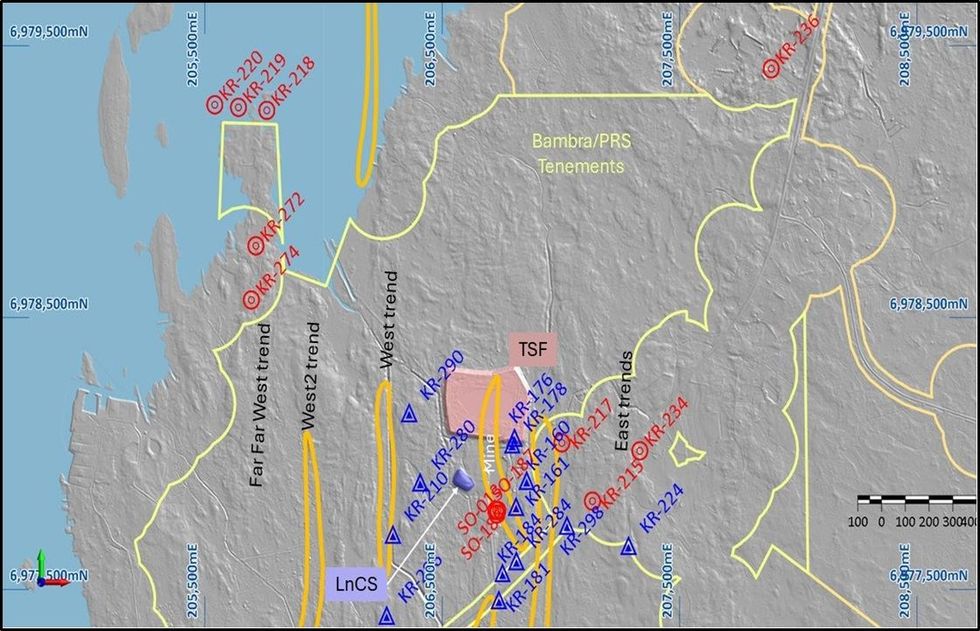
November 10, 2024
Prospech Limited (ASX: PRS, Prospech or the Company) is pleased to announce further assay results from the ongoing program of sampling and assaying of the historic Korsnäs drill core from holes completed in the 1950s, 60s and early 70s.
A total of 307 samples from 25 holes are reported.
- Further impressive assay results received from 307 samples, 25 historical drill holes
- Assays include heavy REEs (Terbium (Tb) and Dysprosium (Dy)) results up to 86 ppm and 313.4 ppm respectively
- Numerous high grade and broad REE intersections are reported, such as:
- KR-272: 11.4m @ 13,383 ppm TREO1 from 102.7 (NdPrO2 3,982 ppm)
Including4.0m @ 32,831 ppm TREO from 106.7m
(40.9 ppm Tb4O7; 227.4 ppm Dy2O3; 9,943 ppm NdPrO) - SO-187: 17.4m @ 9,798 ppm TREO from 0.0m (NdPrO 3,087 ppm)
Including3.0m @ 48,465 ppm TREO from 11.4m
(86.0 ppm Tb4O7; 313.4 ppm Dy2O3; 15,557 ppm NdPrO)
- KR-272: 11.4m @ 13,383 ppm TREO1 from 102.7 (NdPrO2 3,982 ppm)
- The tables of REE Mineralised Zones >1,000 ppm TREO (in the announcement below) detail many more results worthy of attention
Prospech Managing Director, Jason Beckon, commented:
"Korsnäs keeps delivering standout results, with recent recognition of high grade zones rich in critical Heavy Rare Earth Elements (HREEs) like dysprosium (Dy) and terbium (Tb).
While Korsnäs is primarily a carbonatite-associated deposit known for valuable magnet REEs such as neodymium (Nd) and praseodymium (Pr), the presence of significant Dy and Tb mineralisation is a major advantage. These heavy REEs are crucial for producing high strength magnets which hold up under high temperatures and perform reliably in demanding applications like electric vehicles, wind turbines and high-efficiency motors.
With current supply disruptions in China, securing a stable source of these materials is more important than ever. Prospech is looking to meet this need, positioning itself as a dependable future supplier of magnet critical HREEs. Our commitment to thoroughly assessing these enriched zones at Korsnäs reflects our confidence in the project’s potential and our determination to support the growing global demand for sustainable energy technologies. By developing Korsnäs as a secure supply source, we are not just meeting immediate industry needs; we’re playing a key role in strengthening the resilience of global rare earth supply chains for the long term."
Initially developed as a lead mine, the Korsnäs project also hosts extensive rare earth element (REE) zones, which remain open both along strike and at depth. The site features a series of layered carbonatite zones, each up to 20 metres thick and separated by 50 to 100 metres along the strike. These REE enriched zones correlate with gravity anomalies, represented as orange ellipses on the included plan. So far, five such anomalies have been identified, extending over a strike length of more than 5 kilometres.
Focusing on REE mineralisation, the Company has conducted a comprehensive REE sampling program on the historic Korsnäs core stored by GTK at their data facility. Assay results have been reported in ASX announcements on 11 May 2023, 14 June 2023, 5 September 2023, 24 October 2023, 21 November 2023, 12 December 2023, 16 January 2024, 5 February 2024, 26 March 2024, 4 July 2024 and 4 November 2024.

Presented below are two tables of assay intersections from the latest batch. The first table lists intersections from newly assayed holes that have not been reported before. The second table (in two parts) includes intersections from previously reported holes, now updated with additional assays from the margins of mineralised zones.
Click here for the full ASX Release
This article includes content from Prospech Limited, licensed for the purpose of publishing on Investing News Australia. This article does not constitute financial product advice. It is your responsibility to perform proper due diligence before acting upon any information provided here. Please refer to our full disclaimer here.
The Conversation (0)
Latest News
Interactive Chart
Latest Press Releases
Related News
TOP STOCKS
American Battery4.030.24
Aion Therapeutic0.10-0.01
Cybin Corp2.140.00